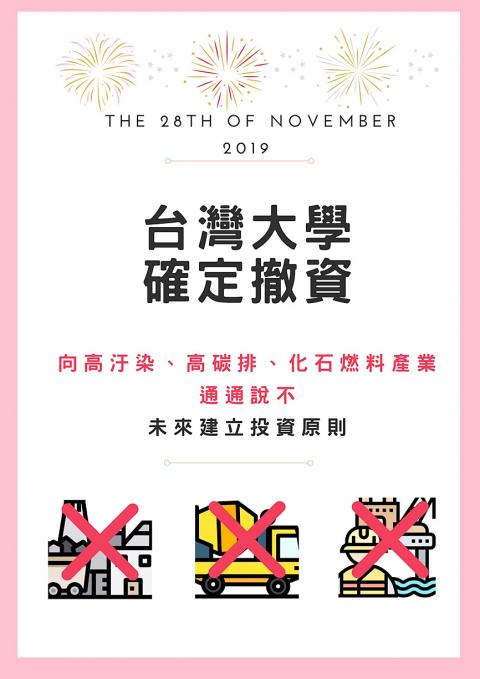National Taiwan University (NTU) plans to divest NT$432 million (US$14.3 million) from six “high pollution” and “high carbon emission” companies by the end of next year, the university’s Student Association said.
NTU’s chief financial officer (CFO) told the student group that the school has targeted six companies, accounting for 22 percent of the university’s investments, and has already divested from four of them, NTU Student Association head of sustainability Huang Yu-ting (黃毓庭) said.
Divestment from the remaining companies is expected to be completed by the end of next year, she said, adding that the university did not publicly reveal the names of the companies.

Photo taken from the National Taiwan University Student Association Department of Sustainability Facebook page
The association said that it had previously asked university presidential candidates whether they would divest the school’s fund from “high pollution, high carbon emission” companies, and NTU president Kuan Chung-ming (管中閔), then a candidate, promised he would.
On Nov. 28, the association received details on the divestment from the CFO, who told them that starting in mid-September, the university had begun the divestment process, Huang said.
Although the university’s divestment is “the first in Asia,” more than 150 universities around the world are already doing the same, she said.
International groups that track divestments would base their observations on public and official commitments made by the university, she said, urging NTU to make a public announcement.
She said that NTU should set guidelines for future investments and that it consider not just profit, but also environmental risks.
In the past, the university has invested in companies with the top 12 highest levels of greenhouse gas emissions in Taiwan, Huang said.
She said she believes that input from university professors could help it establish better investment parameters.
Investments by NTU’s fund in China Steel Corp, Asia Cement Corp, Taiwan Cement Corp, Formosa Plastics Group and other companies total about NT$260 million, the student associations’ data showed.

‘DENIAL DEFENSE’: The US would increase its military presence with uncrewed ships, and submarines, while boosting defense in the Indo-Pacific, a Pete Hegseth memo said The US is reorienting its military strategy to focus primarily on deterring a potential Chinese invasion of Taiwan, a memo signed by US Secretary of Defense Pete Hegseth showed. The memo also called on Taiwan to increase its defense spending. The document, known as the “Interim National Defense Strategic Guidance,” was distributed this month and detailed the national defense plans of US President Donald Trump’s administration, an article in the Washington Post said on Saturday. It outlines how the US can prepare for a potential war with China and defend itself from threats in the “near abroad,” including Greenland and the Panama

The High Prosecutors’ Office yesterday withdrew an appeal against the acquittal of a former bank manager 22 years after his death, marking Taiwan’s first instance of prosecutors rendering posthumous justice to a wrongfully convicted defendant. Chu Ching-en (諸慶恩) — formerly a manager at the Taipei branch of BNP Paribas — was in 1999 accused by Weng Mao-chung (翁茂鍾), then-president of Chia Her Industrial Co, of forging a request for a fixed deposit of US$10 million by I-Hwa Industrial Co, a subsidiary of Chia Her, which was used as collateral. Chu was ruled not guilty in the first trial, but was found guilty

DEADLOCK: As the commission is unable to forum a quorum to review license renewal applications, the channel operators are not at fault and can air past their license date The National Communications Commission (NCC) yesterday said that the Public Television Service (PTS) and 36 other television and radio broadcasters could continue airing, despite the commission’s inability to meet a quorum to review their license renewal applications. The licenses of PTS and the other channels are set to expire between this month and June. The National Communications Commission Organization Act (國家通訊傳播委員會組織法) stipulates that the commission must meet the mandated quorum of four to hold a valid meeting. The seven-member commission currently has only three commissioners. “We have informed the channel operators of the progress we have made in reviewing their license renewal applications, and

A wild live dugong was found in Taiwan for the first time in 88 years, after it was accidentally caught by a fisher’s net on Tuesday in Yilan County’s Fenniaolin (粉鳥林). This is the first sighting of the species in Taiwan since 1937, having already been considered “extinct” in the country and considered as “vulnerable” by the International Union for Conservation of Nature. A fisher surnamed Chen (陳) went to Fenniaolin to collect the fish in his netting, but instead caught a 3m long, 500kg dugong. The fisher released the animal back into the wild, not realizing it was an endangered species at